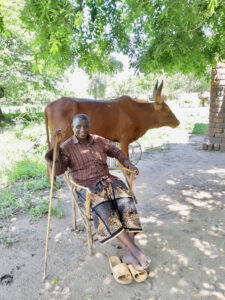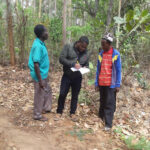You’ll find our newsletters in the newsletter archive.
OUR SALES WAREHOUSE COULD SELL MUCH MORE
 2024-09-14. The TBM sales warehouse in Dar es Salaam is sold out, with only a small amount of rice and wheat flour left. Transport and supply are lagging far behind the needs of local small restaurants. Bahat explains to farip Foundation President Peter Reinhard: “We’re going to put pallets on the floor here to improve storage conditions.” Meanwhile, Queen is waiting at the point-of-sale, for which she’s also responsible next to running her street food: “The TBM truck is coming this afternoon. It’s bringing me a large bag of potatoes, which I’ve already paid for by phone. By evening, I’ll be able to serve the ever-popular fried potato chips at my restaurant right next door.”
2024-09-14. The TBM sales warehouse in Dar es Salaam is sold out, with only a small amount of rice and wheat flour left. Transport and supply are lagging far behind the needs of local small restaurants. Bahat explains to farip Foundation President Peter Reinhard: “We’re going to put pallets on the floor here to improve storage conditions.” Meanwhile, Queen is waiting at the point-of-sale, for which she’s also responsible next to running her street food: “The TBM truck is coming this afternoon. It’s bringing me a large bag of potatoes, which I’ve already paid for by phone. By evening, I’ll be able to serve the ever-popular fried potato chips at my restaurant right next door.”
Institute of Development Studies at the University of Dar es Salaam
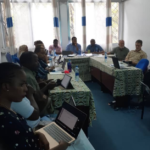 Dar es Salaam, 2024-09-10. The first stop on the farip delegation’s journey through Tanzania is the Institute of Development Studies at the University of Dar es Salaam. During the kick-off meeting, the university outlines the topics it plans to research. Institute Director Colman Msoka states: “Tree-secured loans have great potential to promote rural development. We absolutely need to develop our research questions on-site in Magunguli, during conversations with the local villagers.”
Dar es Salaam, 2024-09-10. The first stop on the farip delegation’s journey through Tanzania is the Institute of Development Studies at the University of Dar es Salaam. During the kick-off meeting, the university outlines the topics it plans to research. Institute Director Colman Msoka states: “Tree-secured loans have great potential to promote rural development. We absolutely need to develop our research questions on-site in Magunguli, during conversations with the local villagers.”
Read more about the tree-secured credit for rural development mechanism here.
University Visits GRACOMA Field Laboratory
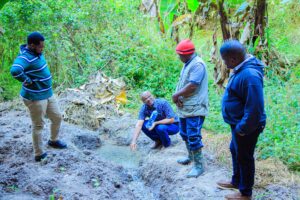 Magunguli, 2024-06-01. The University of Dar es Salaam UDSM is now also interested in the tree-secured credit mechanism. Dr. Colman Msoka, the head of the Institute for Development Studies IDS at the university, and his assistant Dr. Patrick Mlinga traveled to Msowero, to prepare their on-site research cycle on biodiversity and smallholder loans. Dr. Colman Msoka commented, «Tree-secured loans have great potential to promote rural development.»
Magunguli, 2024-06-01. The University of Dar es Salaam UDSM is now also interested in the tree-secured credit mechanism. Dr. Colman Msoka, the head of the Institute for Development Studies IDS at the university, and his assistant Dr. Patrick Mlinga traveled to Msowero, to prepare their on-site research cycle on biodiversity and smallholder loans. Dr. Colman Msoka commented, «Tree-secured loans have great potential to promote rural development.»
Accompanied by Bahat and Elibariki, farip‘s local partners, the institute’s leadership visited not only farmers but also to engaged with local authorities and banks.
Read more about the GRACOMA credit mechanism here.
Persistent Heavy Rainfall in Tanzania
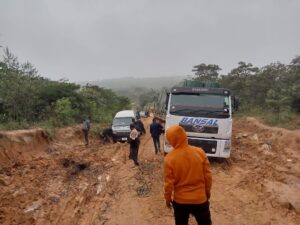 Idete, 2024-04-09. Heavy and prolonged rainfall is rendering the roads impassable in Tanzania. In Idete, for instance, a shipment of maize and dried beans was supposed to be collected by farip‘s local partner, but the pickup truck slid off the rain-soaked road in the Holo Mountains, overturned, and lost its entire cargo in the pouring rain. The driver and passenger sustained fractures and had to be taken to Ikelu for medical care.
Idete, 2024-04-09. Heavy and prolonged rainfall is rendering the roads impassable in Tanzania. In Idete, for instance, a shipment of maize and dried beans was supposed to be collected by farip‘s local partner, but the pickup truck slid off the rain-soaked road in the Holo Mountains, overturned, and lost its entire cargo in the pouring rain. The driver and passenger sustained fractures and had to be taken to Ikelu for medical care.
How can such losses and unexpected hospital expenses be covered? Conventional insurance options are exceptionally costly. However, could insurance backed by growing trees serve as a solution for emergency costs? This very question is now being discussed among farming families in southern Tanzania. Tree-Secured Credits for Rural Development (TCRD) might be a practical mechanism.
GRACOMA
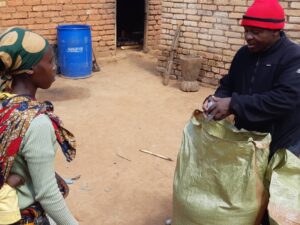 Magunguli, September 15, 2023. Small-scale farmers in Tanzania don’t have access to bank loans, so they need to find their own ways to finance their investments. One example is through their own GRACOMA credit system: Ten farming families in Magunguli received a GRACOMA loan a few months ago and used it to grow potatoes and beans on their fields. They’ve now had a successful harvest, which was marketed well in Mabibo, a suburb of Dar es Salaam. The farmers were able to pay back the loans with interest, and they have earned a decent amount of money.
Magunguli, September 15, 2023. Small-scale farmers in Tanzania don’t have access to bank loans, so they need to find their own ways to finance their investments. One example is through their own GRACOMA credit system: Ten farming families in Magunguli received a GRACOMA loan a few months ago and used it to grow potatoes and beans on their fields. They’ve now had a successful harvest, which was marketed well in Mabibo, a suburb of Dar es Salaam. The farmers were able to pay back the loans with interest, and they have earned a decent amount of money.
GRACOMA is an experiment that registers forest trees and uses them as collateral for loans. It wasn’t at all certain that such a credit system would work in practice. Until now, it was mainly theoretical discussions that were carefully considered by our project partners in Tanzania. With the success of this first attempt in the fields, we have now achieved a significant milestone: GRACOMA works in practice!
Fattening cows, can this work?
Msowero, May 2023. It all depends on the rain. Because the rains did not come last year, many farmers in Msowero were unable to harvest maize. Instead of selling it, they used the previous year’s stored maize for sowing. This is why they could not pay back the advance payments from the trading company TBM. To stay in the maize business with TBM and pay off the debt quickly, they produced an idea: to buy skinny free-range cows cheaply from the Maasai and fattening them on their farm for five months. The proceeds will serve to pay off their debt. They hope that the rains will cooperate this year.
farip is also involved in this business, providing five small loans to reliable and influential farmers to test their idea for suitability. It does not seem to be working badly, although this year the rains are very late and sparse. As a result, the farmers want to keep and feed the cows for two months longer than planned.
Let’s see. Once again it proves true that the path from an innovative idea to a successful trial can be really bumpy. In any case, Malahi Chalahani, an elder of the Sukuma clan in Msowero, is very confident.
Testing the suitability of the GRACOMA idea
Magunguli, spring 2023. Our local partner and trustee Elibariki Tweve visits a forest plot of farmers in Magunguli. He is about to register the trees growing there as loan collateral. Five farmers intend to use the loan to invest in seeds and work force. Each of them intends to cultivate one acre (just under half a hectare) of beans. With this small-scale test run, farip is testing the suitability of the GRACOMA idea, which was developed by the farmers themselves: GRACOMA (Growing Assets Collateral Management) is designed to enable farmers who previously had no access to credit to offer growing trees as collateral for loans. “If this experiment succeeds as the farmers envision, we will have made an important breakthrough for the independent financing of projects in rural areas,” Ueli Scheuermeier, CEO of farip, is pleased to say.
The local liaison officer for the trading company TBM
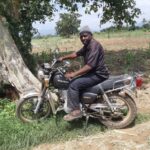 Msowero, early 2023. “Karibu! I’m Menas Yapesa, a farmer in the extensive village of Msowero. I’m also the local liaison officer for the trading company TBM. That means travelling around the area, visiting farmers to look at their fields, maize stores and cows. I also organise TBM’s sale of their produce. The company uses an innovative method here: When it takes over the goods, TBM pays farmers an advance called “cash on the bag”. It then takes care of the marketing in distant towns without any middlemen creaming off profits. TBM guarantees that sales revenues are fairly distributed to the producers. That’s why we farmers prefer working with them.
Msowero, early 2023. “Karibu! I’m Menas Yapesa, a farmer in the extensive village of Msowero. I’m also the local liaison officer for the trading company TBM. That means travelling around the area, visiting farmers to look at their fields, maize stores and cows. I also organise TBM’s sale of their produce. The company uses an innovative method here: When it takes over the goods, TBM pays farmers an advance called “cash on the bag”. It then takes care of the marketing in distant towns without any middlemen creaming off profits. TBM guarantees that sales revenues are fairly distributed to the producers. That’s why we farmers prefer working with them.
To do my job, I need a reliable motorbike. When my old one broke down, farip quickly gave me a loan. That meant I could immediately afford a second-hand replacement and continue to ensure TBM’s presence in Msowero.”
Keeping supply chains in their own hands
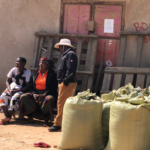
The first point of sales outlet for agricultural products from the inner country is being built here in Makambako
Dar es Salaam, 2022-10-28. The vast majority of low-income earners in the major urban centers in Tanzania struggle to secure food of good quality at reasonable prices – even though this is by far the largest market for agricultural products.
What if the supply of agricultural products from rural producers could be sold through a separate network of points of sale in the cities, providing small amounts of healthy daily groceries in good quality?
A delegation of several members of the farip Foundation has just left for Tanzania to explore such a points of sale project in more detail. Among them are two students of the University of St. Gallen (HSG). They volunteered to dedicate their Master theses in Business Innovation to helping farip with a scientifically solid proof of concept/feasibility study. (Kudos and many thanks!)
The project idea is to set up small warehouses for depositing goods along the route of a truck providing “transport-by-schedule”. Customers like Fatuma with her cookshop could store their deliveries there and pick them up according to their daily needs. A prototype of a point of sale in Dar es Salaam is on this blog’s illustration. Stay tuned to read more about it here soon!
AGROFORESTRY WITH WILD FRUITS
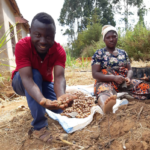 Magunguli, 2022-09-25. Ragpa Tweve and his wife Christina run a tree nursery for afforestation in Magunguli, Tanzania. They are now experimenting with propagating indigenous forest trees with edible wild fruits: Mikusu, for example, are very popular. They sell the seedlings to farmers for their reforestations. Their vision: Farmers are preserving the natural forest plus earn money by processing and marketing the wild fruits. They receive support from farip for their pioneering work. Our vision is a combination with the GRACOMA project: The trees enable CO2-sequestration in addition to yielding popular fruits.
Magunguli, 2022-09-25. Ragpa Tweve and his wife Christina run a tree nursery for afforestation in Magunguli, Tanzania. They are now experimenting with propagating indigenous forest trees with edible wild fruits: Mikusu, for example, are very popular. They sell the seedlings to farmers for their reforestations. Their vision: Farmers are preserving the natural forest plus earn money by processing and marketing the wild fruits. They receive support from farip for their pioneering work. Our vision is a combination with the GRACOMA project: The trees enable CO2-sequestration in addition to yielding popular fruits.
SMARTPHONES USED IN COACHING
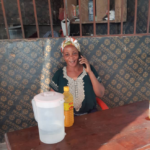 Kigamboni, Dar es Salaam, 2022-08-31. farip has received a dozen Samsung Galaxy 8 smartphones from the donor community, which are now being used by Elibariki in coaching and for communication with farip-supported ventures. Fatuma Sadiki, who previously had to borrow a mobile phone from friends, immediately demonstrates independence. She can now easily pass on information: “The smartphone helps me communicate with clients, I can also share information about my cookshop on social media and research new cooking techniques.”
Kigamboni, Dar es Salaam, 2022-08-31. farip has received a dozen Samsung Galaxy 8 smartphones from the donor community, which are now being used by Elibariki in coaching and for communication with farip-supported ventures. Fatuma Sadiki, who previously had to borrow a mobile phone from friends, immediately demonstrates independence. She can now easily pass on information: “The smartphone helps me communicate with clients, I can also share information about my cookshop on social media and research new cooking techniques.”
Fatuma has been running her cookshop in Kigamboni, the port district of Dar es Salaam, for almost a year now. In a difficult environment, she managed initial repayments on the farip loan – despite the sales drop during the Corona pandemic and the current price increases for cereals!
A next development step for Fatuma could be to operate a BOP (“bottom of the pyramid, i.e. for very low-income clients) sales point in Kigamboni together with TBM, for deliveries of agricultural products from remote rural parts of Tanzania.

